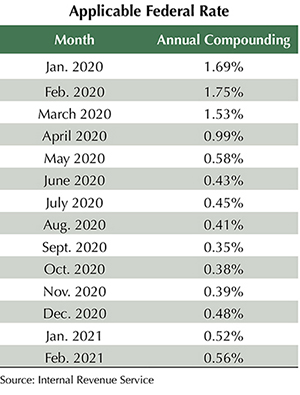President Joe Biden has proposed tax changes that could significantly impact real estate professionals. Among them are increasing the maximum income tax rate, changing how long-term capital gains are taxed, increasing the corporate income rate, and repealing Section 1031 exchanges.
quick links
The presidential election in November 2020 and the accompanying congressional elections presented diametrically opposed points of view on many issues, including taxation. How these competing visions play out in the first months of 2021 will occupy center stage as the most important current tax development.
Real estate professionals, particularly investors and developers need to be mindful of impactful tax legislation. After all, higher taxes are a risk to be considered along with numerous other risks.
Behind the façade of the pending questions of tax reform is the eternal question of who is to be taxed. The late Senator Russell Long of Louisiana, who served as chair of the Senate finance committee from 1966 to 1981 and influenced most tax legislation of the latter half of the 20th century, made one of the wittier statements about taxation: “Don’t tax you, don’t tax me, tax that fellow behind the tree.”
Tax Rule Changes to Watch
President Joe Biden’s proposed tax plan has many parts, but those most potentially impactful to real estate professionals and investors are:
- Increasing the maximum income tax rate. This would increase the top individual income tax rate for taxable incomes above $400,000 from the current maximum tax rate of 37 percent to 39.6 percent.
- Removing the cap on Social Security taxes. Social Security taxes would be imposed on taxpayers earning more than $400,000. Presently, they’re imposed only on the first $137,700 of income.
- Changing how long-term capital gains are taxed. This would tax long-term capital gains and qualified dividends at the ordinary income tax rate of 39.6 percent on income above $1 million. Presently, capital gains are taxed at 20 percent.
- Repealing Section 1031 like-kind exchanges.
- Eliminating step-up basis for inherited property. Presently, the cost basis for inherited property is the fair market value of the property at the time of the owner’s death. This means someone who inherits property does not pay a capital gains tax on the appreciation inherent in the property at death. This would change under Biden’s tax plan.
- Limiting itemized deductions. Itemized deductions under the proposal would be limited or capped at 28 percent of their value even though the maximum tax rate is proposed to be 39.6 percent for those earning over $400,000. Thus, the proposal creates a gap between the tax benefit of the itemized deduction and the income tax rate, at least for higher earners. This proposed limit on itemized deductions would not affect business deductions, rental properties, or real estate expenses for investors.
- Increasing corporate income tax rate from 21 to 28 percent. This would not affect those operating under a partnership or LLC not taxed as a corporation.
- Lowering estate and gift tax exemptions to $3.5 million. The exemption is presently $11.7 million, so this represents a significant increase in the estate and gift tax.
The goal for eliminating these and other tax breaks is to raise tax revenue to pay for Biden’s domestic agenda goals, such as bolstering childcare and care for the elderly. Nevertheless, enactment of these tax reforms would have a major impact on real estate business and investing.
Some of the proposed changes have the potential to be more disruptive than others. Eliminating the lower capital gains tax rates and merging capital gains and ordinary income into one tax rate would be particularly disruptive. The estate and gift tax changes, such as eliminating the stepped-up basis at death and taxing unrealized appreciation at death, would have a long-term impact on the estate plans of real estate professionals. Like-kind exchanges have been a significant planning choice for those disposing of real estate, so repealing Section 1031 would be painful. All in all, the entire list of tax reforms, if enacted, would be acutely felt in the real estate sector.
Dodging the Bullet: Congressional Gridlock
The anticipated Democratic sweep of both houses of Congress did not unfold quite as the pundits predicted early in the election cycle. The Georgia U.S. Senate election on Jan. 5 gave the Democrats only a slight majority, so the chances of Biden succeeding in enacting his entire tax plan are problematic. Some may hope for congressional gridlock, thinking it will mean no major tax legislation changes and no tax increases. Real estate professionals should take a more nuanced view of the risk of tax legislation resulting in higher tax rates.
“Congressional gridlock” is too simplistic of a notion. While the Democrats will have a slight edge in their effort to enact their tax plan, the path is far from clear. A bipartisan tax bill is not impossible to imagine. Former President Barack Obama enacted tax legislation during his second term when Republicans controlled Congress. While Biden and the Democrats do not have a blank check to enact all of their tax legislation, they might have sufficient power to enact certain parts.
Some tax issues might lend themselves to a majority agreement. Repeal of Section 1031 like-kind exchanges is a good example of a tax issue that might not have broad popular appeal apart from the real estate community and, therefore, might be vulnerable to enactment.
Golden Moment for Wealth Transfers
Next to the political fight over who to tax and how much, the biggest current development in tax law is the rock-bottom Applicable Federal Rate (AFR), which in January 2021 was 0.52 percent and in February 2021 was 0.56 percent for mid-term loans (see table). The AFR is the minimum interest rate allowed for private loans by the Internal Revenue Service (IRS). It is used to determine, among other things, the gift tax for loans to family.
From a tax-planning perspective, this is the golden moment for wealth transfers using low interest rates as the centerpiece strategy. Consider the eye-popping drop in AFR (again, mid-term loans) throughout 2020:

Tax planning using low-interest loans is non-controversial, non-aggressive, and plain vanilla planning, but it is hugely effective. About the only issue is whether the loan is a true loan, as opposed to a gift.
Parents or grandparents who loan money to trusts for children or grandchildren to enable their family trusts to make strategic investments should keep in mind that they can do so at a virtually zero interest rate cost. Why accumulate wealth only to incur an estate or gift tax on transferring the wealth to family when you can use low-interest loans to create the wealth at the family trust level?
However, the rates are starting to rise, so the opportunity afforded by the extraordinarily low interest rates is fading.
Partnership Tax Audits
Another current development that is important to the real estate community is the IRS’ increasing push to audit more partnerships and LLCs that are taxed as partnerships. The IRS is already recruiting agents for this purpose. This is important because the partnership and LLC are the single, dominant form of business entity used in the U.S., and that’s especially so in real estate.
The audit rate for partnerships has been low—less than 1 percent—largely because the rules for partnership audits are complicated. In 2015, when the Bipartisan Budget Act was enacted, the rules for audits of partnerships and entities taxed as partnerships changed along with the rules for determining who is required to pay the tax that results from any corresponding audit adjustments. Those new rules became effective after Dec. 31, 2017.
The new centralized partnership audit rules enable the IRS to audit a partnership tax return and assess the partnership with any tax owing. This change eliminated the need for the IRS to audit and collect tax from individual partners. Because of these changes, many expected the audits of partnerships to increase. This appears to be happening in 2021.
Instead of waiting for a partnership tax audit, get prepared by being proactive. For example:
- Review the partnership agreement to determine how a tax audit would apply.
- Update the agreement as necessary, especially being sure that the old “Tax Matters Partners” provisions have been replaced with the new rules for “Partnership Representative.” Among the provisions in the new audit regime that should be considered for an updated partnership agreement are the appointment, removal, and replacement of the Partnership Representative; the general duties and, specifically, the obligation to provide notice to partners of a tax audit; the Partnership Representative’s authority to resolve the audit; the Partnership Representative’s release from liability; and the new audit regime’s election-out rules.
Concern Over Effective Dates
Another thing to watch for is the effective date of proposed legislation. For example, the prospect of an estate tax increase retroactively taking effect Jan. 1, 2021, is a concern for many.
Rather than being driven by fear of an early effective date of seismic legislation, a better strategy might be to test any tax planning against the metric of “does it make sense?” Clients who were considering tax planning at the end of 2020 should continue planning in first quarter 2021.
Whatever the risk of sweeping tax reform in 2021—whether it results in a 2 percent, 20 percent, or even just 0.2 percent tax increase—there will be a narrow time frame in which to hedge against that risk—perhaps just the first quarter.
Unwinding the Planning
Many people began planning wealth transfers in late 2020 for fear of dramatic tax legislation, but they have doubts about parting with a substantial portion of their wealth.
Because there is a danger of moving too much wealth too soon, the question arises: Is there a way to undo a tax-planning strategy adopted in late 2020? A few fundamental questions to consider:
- If you have to jump through a lot of hoops to undo the planning, then why are you planning in the first place?
- Will transferring wealth keep you from being able to pay bills? If so, then the transfers should not be made.
- Have you taken care of yourself before considering transferring wealth to your children?
Be Proactive, Minimize Tax Risk
Biden’s proposed tax plan, amazingly low IRS approved interest rates, and the anticipated increase in tax audits of partnerships and LLCs each serve the purpose of pointing to tax risk (and opportunities) confronting the more active real estate professionals and investors.
The tax risk is quite real and, without proactive planning, could lead to higher taxes. For those who do not dawdle, however, the opportunities are significant.
Tax laws are complicated, so be sure to consult a tax accountant or tax attorney before making financial decisions.
Tax laws are complicated, so be sure to consult a tax accountant or tax attorney before making financial decisions.
____________________
Elliott ([email protected]) is a Dallas tax attorney, Board Certified, Tax Law; Board Certified, Estate Planning & Probate; Texas Board of Legal Specialization; and Fellow American College of Tax Counsel.
Takeaway
Spring 2021
You might also like

PUBLISHED SINCE 1977
Tierra Grande
Check out the latest issue of our flagship publication.
SUBSCRIBE TO OUR
Publications
Receive our economic and housing reports and newsletters for free.












